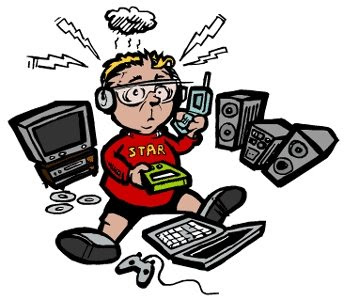 We live in a 24x7 culture, where multitasking isn’t just fashionable; it’s considered essential. Astounding numbers of people write text messages or take phone calls while they’re driving, write to-do lists in meetings, or read e-mails while they’re on the phone. The more tasks we juggle, the more we cram into our lives, the more productive we feel.
We live in a 24x7 culture, where multitasking isn’t just fashionable; it’s considered essential. Astounding numbers of people write text messages or take phone calls while they’re driving, write to-do lists in meetings, or read e-mails while they’re on the phone. The more tasks we juggle, the more we cram into our lives, the more productive we feel.But have we really got it all, or just pieces of everything? Are we juggling too much as we race breathlessly through the day, and are we losing the ability to focus on anything in depth? Has a constant flow of data become something we crave, the symbol of a full life?
Drowning in data
With messages flying at us from all directions, we’re drowning in data. The average office worker receives over 150 e-mails a day, not to mention numerous calls on different types of telephone, faxes, SMS and instant messages from colleagues and friends. Our attention is constantly being demanded by the beeps and rings of one electronic device or another. And this is especially distracting in the workplace, where it can actually stop us doing our job properly and even lead to stress-related health problems.
Many workers are starting to feel that the constant interruptions and demands on their attention are preventing them from concentrating on their work. Our brains need time to disengage from one task and switch attention completely to a new one. Indeed, once we have been taken away from a task, it takes on average half an hour to be able to return to it. In the long term, information overload can erode our ability to focus and think at a deeper level.
Finding the focus
The problem isn’t that there’s too much information: it’s how to deal with it. We need to manage the demand and allocate time for ourselves to concentrate and make the most of the information we receive. Here are a few tips that may help:
• Prioritise. Before you start work, take time to identify what you really need to do, then tackle one task at a time, starting with the most difficult. Don’t try and fit quick and easy tasks in between. With every switch, your brain has to refocus.
• Pay attention. Train yourself to finish one task at a time. Choose what you need to do and do it properly with 100 percent of your attention. Resist the urge to multitask. Think quality, not quantity. Organise your time, take breaks, get some fresh air, refocus.
• Switch off. Don’t be a slave to the beep! When you need to work, switch off e-mail and instant messaging, and put your phones on voice mail. Decide for yourself when is the best time to tackle your in-box. You could perhaps allot two sessions to this task, in the morning and then the afternoon. The important thing is to resist the urge to check messages in between. Tell people you have a new policy in order to get work done. They’ll get used to it.
• Consolidate. When you need to write an e-mail, force yourself to be concise. Five sentences is a good limit. Be considerate: Don’t overload your colleagues’ mail boxes with information and unnecessary messages, like “thanks!” or “great!” Try to send fewer messages, and keep the information in what you do send relevant.
Remember: when you send a message, you may be interrupting someone’s work. Make sure it’s worth it!
For more useful learning tips, please visit the HP Learning Centre.

No comments:
Post a Comment